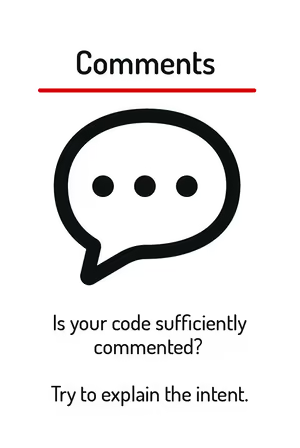Comments

Comments are not just for explaining what the code does, they are for explaining why it does it. Well-placed comments communicate intent, assumptions, and decisions that aren’t obvious from the code alone. If a future developer - including future you - has to spend time guessing why something exists, a comment can save hours.
Good practice is to write comments for intent, not obvious code. For example, instead of:
int total = a + b; // add a and bExplain the reasoning:
// Total cost includes base amount and optional surcharge if user is premium
int total = a + b;Use comments to clarify tricky algorithms, external constraints, or domain-specific rules. Avoid commenting bad code as a shortcut - instead, clean the code and then add comments if the logic still needs explanation.
Before every git commit, read your changes and ask: “Would someone unfamiliar with this know why this exists?” If not, add a short, clear comment. Good comments improve maintainability, reduce bugs, and make your code self-explanatory to the next developer who touches it.